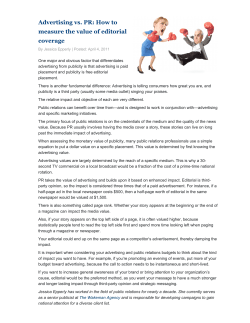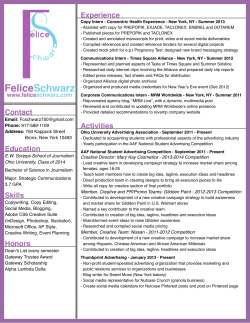
Advertising in Public Schools - Texas Association of School Boards
Advertising in Public Schools Given the reduction in state funds available for public schools, school districts in Texas increasingly rely on local fundraising to support not only special programs but also basic operational needs of public school districts. Advertising has become a particularly attractive method of fundraising for schools as a result of both the need for more diverse sources of funding and the proliferation of media available to send a commercial message to students, parents and the district community. This outline discusses the legal and policy issues presented by various types of advertising agreements that Texas districts may consider. I. Advertising agreements Advertising can take many forms, including: direct advertising in exchange for money; in-kind advertising in exchange for goods or services; or negotiated donation of funds or property in exchange for sponsorship recognition. The outlets for advertising in schools are also numerous: advertising can be placed on permanent, material objects (like school buses, textbook covers, yearbooks, uniforms, or scoreboards); or it can be conceptual (naming rights, sponsorship agreements) or temporary (athletic event announcements, school radio or television, or the district website). All of these arrangements have one thing in common—they are all the subject of an agreement, or contract, between the school district and another entity. A. Authority As with any agreement binding the district, districts must ensure that a representative of the district with appropriate authority reviews and signs the contract on behalf of the district. Depending on the nature or value of the contract and local policy, the board of trustees may need to take action to approve the contract. School officials should consider that some parents and community members feel strongly about keeping ads that promote commercial products out of public education; thus, a decision to engage in a district-wide advertising program may be controversial. In order to address such community concerns, a board may decide to take action on an advertising contract in an open meeting even if board approval is not strictly required. B. Exclusivity The district’s attorney should also review advertising contracts to ensure that the district is getting a good deal on favorable terms that comply with relevant laws and local policy. Some agreements may include restrictions on the district’s ability to engage in other types of fundraising (e.g., sale or advertising of other similar © 2015. Texas Association of School Boards, Inc. All rights reserved. TASB Legal Services Page 2 products). These restrictions should be as limited as possible and must be clearly and specifically explained in the agreement. In addition, the district should review its records prior to agreeing to a contract with exclusivity terms in case the proposed terms would violate a previous contract. C. Procurement Texas Education Code chapter 44 requires districts to competitively procure any contract for the purchase of goods or services valued at $50,000 or more in the aggregate for a 12-month period using one of the methods listed in the statutes.1 At first glance, advertising agreements may not appear to require competitive procurement under Chapter 44. In most situations, even when a district receives items in exchange for a vendor’s right to advertise on district property, the district itself is not purchasing the items directly. Even so, the district may wish to competitively procure the contract by, for example, issuing a request for proposals (RFP). Particularly with regard to high profile and high dollar sources of revenue, an RFP may demonstrate an effort to get the best value for the district even if not strictly required by law. II. Advertising content A. First Amendment As governmental entities, school districts must comply with the First Amendment of the U.S. Constitution when regulating speech or expression on district property. This does not mean, however, that a district must permit any and all speech to occur. The U.S. Supreme Court recognizes different levels of protection for specific types of expression. Advertising is generally considered commercial speech, which is less protected than other types of expression. Rather than the highest level of strict judicial scrutiny applicable to the most protected speech, governmental regulation of commercial speech is constitutionally permissible as long as: (1) the commercial speech is not misleading or unlawful; (2) the asserted governmental interest is substantial; (3) the regulation directly advances the governmental interest; and (4) the scope of the regulation reasonably fits the interest being served.2 Additionally, a court reviewing a district’s regulation of advertising must also consider the setting, or forum, of the advertisement. Three types of forums are traditionally recognized under the First Amendment: (1) traditional public forums; (2) limited or designated public forums; and (3) nonpublic forums. Generally speaking, school campuses are considered nonpublic forums.3 When a district enters into an advertising agreement, the district may want to clarify this point in policy or the agreement to preserve the nonpublic nature of the forum. Otherwise, the district risks 1 2 3 Tex. Educ. Code § 44.031(a). See Board of Trustees of the State Univ. of New York v. Fox, 492 U.S. 469 (1989) (clarifying commercial speech analysis in Central Hudson Gas & Elec. Corp. v. Public Service Comm’n of New York, 447 U.S. 557 (1980)). Hazelwood Sch. Dist. v. Kuhlmeier, 484 U.S. 260, 266 (1988). © 2015. Texas Association of School Boards, Inc. All rights reserved. TASB Legal Services Page 3 inadvertently creating a more open forum in which efforts to apply policy or criteria to speech, even commercial speech, could be subject to a higher level of scrutiny.4 Regardless of the forum, the First Amendment also prohibits viewpoint discrimination. In other words, if district policy allows a certain subject matter to be addressed in advertising, then it must accept all viewpoints on that subject.5 As long as the district’s reasons for declining a specific advertisement are reasonable and viewpoint-neutral, courts have upheld districts’ refusal to sell advertising space to religious or controversial organizations.6 For example, a federal court in West Texas upheld Lubbock ISD’s ability to deny advertising space to a private company that sought to display an image of a tattooed Jesus and the website “www.jesustattoo.org” on the district’s jumbotron.7 Lubbock ISD rejected the proposed advertisement, in part because employees and students were not permitted to display tattoos at school. The company sued the district, alleging unconstitutional viewpoint discrimination based on the religious message conveyed in the advertisement. The court first found that the jumbotron was a limited public forum, based on the purpose of the forum as expressed in the district’s policy GKB(LOCAL), a TASB recommended policy which stated that advertising was accepted “solely for the basis of covering the costs of providing materials and equipment, not for the purpose of establishing a forum of communication.”8 The court found the district’s denial of the Jesus tattoo advertisement was reasonable in light of district policy and the purpose of the forum. B. District policy District policy should define advertising narrowly in order to make it clear that the district does not intend to create a public forum, as discussed above. In addition, a good advertising policy should specify that the district may reject advertising that is inconsistent with federal or state law, board policy, district or campus regulations, or curriculum, as well as any content which the district determines has a reasonable 4 5 6 7 8 See, e.g., Demmon v. Loudoun County Public Sch., 342 F.Supp.2d 474 (2004) (rejecting school’s argument that it did not intend to create a public forum where school sold bricks to school walkway and encouraged purchasers to express their feelings in brick inscriptions as fundraising project). See Cornelius v. NAACP Legal Defense & Educ. Fund, Inc., 473 U.S. 788 (1985) (holding that governmental entity may regulate content of speech in nonpublic forum as long as restrictions are reasonable and viewpoint-neutral). See DiLoreto v. Downey Unified Sch. Dist. Bd. of Educ., 196 F.3d 958 (9th Cir. 1999), cert. denied, 529 U.S. 1067 (2000) (upholding refusal of advertisement containing text of Ten Commandments based on concerns regarding disruption and controversy). See also Planned Parenthood, Inc. v. Clark County Sch. Dist., 941 F.2d 817 (9th Cir. 1991) (en banc) (concluding that school newspaper did not open a public forum by selling advertising space merely to fund the project, and school’s reason for declining an ad from Planned Parenthood about birth control was reasonable and viewpoint neutral). Little Pencil, LLC v. Lubbock Indep. Sch. Dist., Civil Action No. 5:14-CV-014-C (N.D. Tex. May 29, 2014). Little Pencil, LLC v. Lubbock Indep. Sch. Dist., Civil Action No. 5:14-CV-014-C, at 16-17 (N.D. Tex. May 29, 2014) (italics in original). © 2015. Texas Association of School Boards, Inc. All rights reserved. TASB Legal Services Page 4 likelihood of exposing the district to controversy, litigation, or disruption. A district considering an advertising program as a source of revenue should contact its TASB policy consultant to ensure that the district’s policy GKB(LOCAL) contains these elements. III. Specific forms of advertising A. Outdoor advertising Districts considering advertising on school grounds should be aware that outdoor advertising is strictly regulated in the Texas Transportation Code.9 In general, advertising is subject to the statutes if it consists of an outdoor sign, display, light, device, figure, painting, drawing, message, plaque, poster, billboard, or other thing designed, intended, or used to advertise or inform, and if any part of the advertising or information content is visible from the main-traveled way of the interstate or primary system.10 Willful violation can result in criminal and civil penalties; in some cases, a fine of $500 to $1,000 may be assessed per day that the illegal sign is displayed.11 Some districts may be able to take advantage of an exception to the strict regulation of outdoor advertising: an outdoor advertising sign may include the logo or emblem of an entity if the sign is erected or maintained by a public school in a county with a population of 65,000 or less; the entity sponsors or provides significant funding to the school; and the entity's logo or emblem occupies less than 25 percent of the area of the sign.12 Thus, if a local business satisfies these requirements, a district in certain counties may include the business logo on a sign erected by the district. TASB policies GKB(LEGAL) and GKB(LOCAL) contain further guidelines for outdoor advertising. B. School bus advertising Exterior advertising on school buses is permitted in Texas but strictly regulated by Texas Department of Public Safety rules, which establish where ads can be posted, how much of the school bus can be covered by ads, and the material that can be used to make the ads. In addition, districts that display advertising on school buses are subject to certain reporting requirements.13 The standards for school bus advertising are located in your policy manual at TASB policy CNB(LEGAL). 9 10 11 12 13 See Tex. Transp. Code chs. 391-395; 43 Tex. Admin. Code ch. 21, subch. I. Tex. Transp. Code § 391.001(10). Tex. Transp. Code §§ 391.031, .061. Tex. Transp. Code § 391.037. See 37 Tex. Admin. Code §§ 14.01 et seq. © 2015. Texas Association of School Boards, Inc. All rights reserved. TASB Legal Services Page 5 C. Naming rights, corporate sponsorships and scoreboards In a naming rights agreement, the district agrees to name a district facility after an entity or individual (typically, a corporate sponsor) in exchange for money, goods, or some other benefit. Scoreboard agreements are another high profile funding opportunity in which a district may receive a scoreboard for its athletic facility in exchange for the provider’s right to sell and display advertising on the scoreboard. These arrangements are essentially a form of advertising agreement; as such, all the issues discussed above apply. In addition, naming rights, corporate sponsorships and scoreboard deals raise some unique concerns. 1. Title IX Funds or materials received through a naming rights, corporate sponsorship or scoreboard agreement can impact a district’s compliance with Title IX, the federal law prohibiting gender discrimination in district programs.14 One of the many factors considered in determining compliance with Title IX is the funding level of related programs.15 Once a district receives private funding the funds are public money and may not be used in a disproportionate manner that favors one gender.16 Districts should include donated resources, including equipment or signage, in assessing whether both male and female athletic participation is supported fairly. 2. Bond issues Districts that seek to sell the naming rights to a structure that was financed by state and local bonds should consult with the district’s bond counsel regarding the potential consequences. The Internal Revenue Service (IRS) has determined that selling naming rights may cause state or local bonds to become taxable as “private activity bonds.”17 More specifically, under the “private use business test,” if more than 10 percent of the bond proceeds are used for a nongovernmental purpose, the bonds qualify as taxable private activity bonds.18 Applying this test, the IRS compares the fair market value of the cost of construction of the facility with the fair market value of the naming rights, and if the cost of the naming rights exceeds 10 percent the interest on the bonds could be treated as taxable. Districts should keep this in mind before agreeing to a sale of naming rights that could impact the ability of the bonds to provide tax-free interest to investors. 14 15 16 17 18 See 20 U.S.C. §§ 1681 et seq. 34 C.F.R. § 106.41(c). See also Favia v. Indiana Univ. of Penn., 7 F.3d 332 (3d Cir. 1993) (holding that expenditures are one factor in deciding whether the requisite equal opportunity was available). Chalenor v. Univ. of North Dakota, 291 F.3d 1042 (8th Cir. 2002). I.R.S., Priv. Ltr. Rul. 200323006 (June 6, 2003). 26 U.S.C. § 141. © 2015. Texas Association of School Boards, Inc. All rights reserved. TASB Legal Services Page 6 3. Public perception As with other forms of advertising, a board’s decision to name a facility after a private entity or accept a corporate sponsorship may result in controversy. Parents and other concerned citizens argue that students are particularly susceptible to corporate messaging. School officials should be prepared to face objections and explain to the public how the relationship will serve the educational mission of the district. Districts planning a corporate sponsorship initiative should ensure that local policy and viewpoint-neutral regulations allow the district to refuse entities that contradict the district’s mission or policies. For example, no school board wants to explain to its community why the district had to acknowledge the Ku Klux Klan as a corporate sponsor.19 In order to avoid less desirable corporate sponsors, a district may consider adopting local policy governing when a district will accept or refuse donations in addition to addressing advertising in GKB(LOCAL) as described above.20 Boards should also remember the example of Houston’s former Enron Field. Selling the naming rights to a permanent facility inevitably means associating the district with the reputation of an entity outside the board’s control. It is important to think about the long-term impact of such an agreement. Conclusion Advertising is a powerful fundraising tool, but like most powerful tools, it involves some risk. Districts looking to increase their revenue through an advertising program are wise to consider consulting with an attorney on the potential legal ramifications, particularly if the deal involves binding the district to specific terms and obligations. School officials should also engage with community stakeholders early in the process of embarking on any major advertising agreement and be prepared to respond to criticism. Finally, districts should adopt legally defensible policies and administrative guidelines that define the district’s objectives and the lines of authority for approval of advertising agreements and content. With these controls in place, districts will be in a good position to benefit from the power of advertising. For more information on this and other school law topics, visit TASB School Law eSource online at schoollawesource.tasb.org. This document is provided for educational purposes only and contains information to facilitate a general understanding of the law. It is not an exhaustive treatment of the law on this subject nor is it intended to substitute for the advice of an attorney. Consult with your own attorneys to apply these legal principles to specific fact situations. 19 20 See, e.g., Cuffley v. Mickes, 208 F.3d 702, 705 (8th Cir. 2000) (holding Missouri’s denial of the KKK to be included in state adopt-a-highway program amounted to unconstitutional infringement on KKK’s right to free speech). See TASB Model Policy CDC(LOCAL). © 2015. Texas Association of School Boards, Inc. All rights reserved. TASB Legal Services
© Copyright 2025









